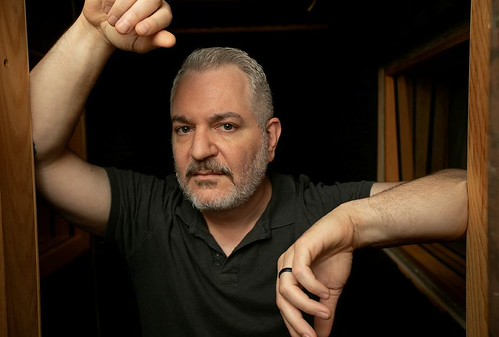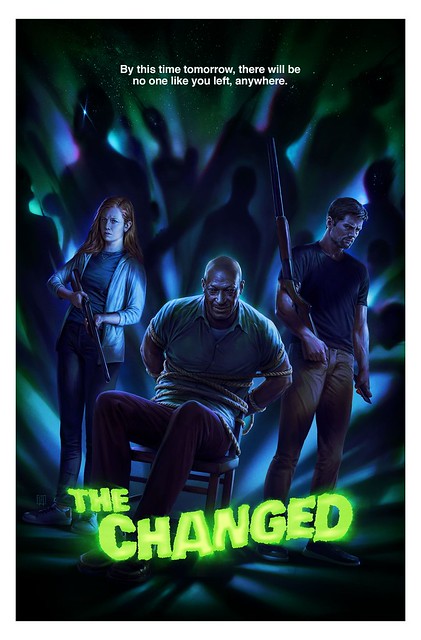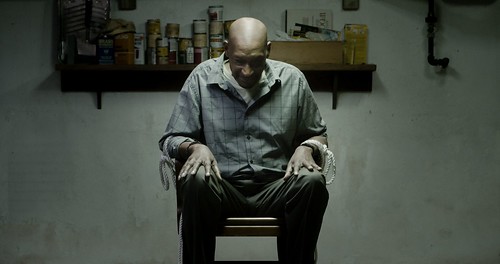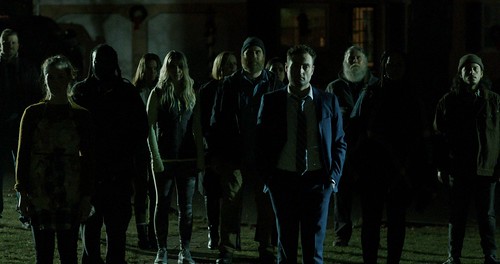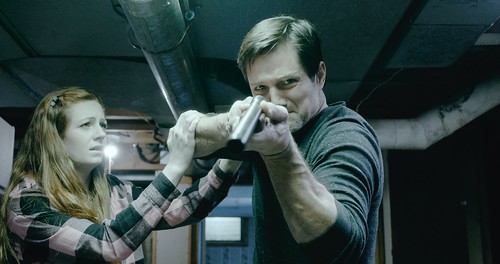Movies & TV / Columns
Michael Mongillo On His New Sci-Fi Thriller The Changed, Working With Tony Todd
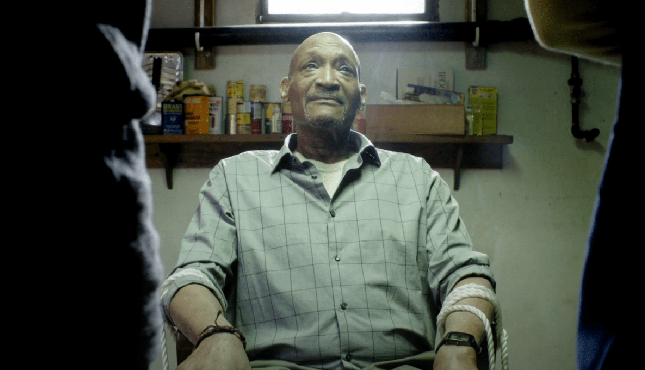 Image Credit: Mean Time Productions
Image Credit: Mean Time Productions
The 411 Interview: Michael Mongillo
Michael Mongillo is a writer, director, and producer who has been involved in the movie business since, according to imdb, at least 1995. Mongillo has directed such short films as A Love Letter to Steve McQueen and Trans Am: Anthropocene and the feature films Welcome to Earth, Being Michael Madsen, and Diane (check out my review of Diane here). Mongillo’s latest movie is the sci-fi thriller The Changed featuring modern horror icon Tony Todd. In this interview, this writer talks with Mongillo about making The Changed, working with Tony Todd, and more.
**
Bryan Kristopowitz: Why did you want The Changed to be your next movie as a director?
Michael Mongillo: To be honest, I didn’t. We’ve been trying to make a serial killer story titled Meanest Man in the World for some time now, even before we shot our last film, Diane. With The Changed, Team Mean Time was originally going to make it with a significantly smaller budget but as principal photography got closer, it was just too few people doing too much work, too much stress, and we were looking at far too many compromises so we pulled the plug. Then, completely by chance, an investor stepped in who was wildly enthusiastic about the script so we were able to make The Changed happen where we were able to alleviate most of those obstacles (note I didn’t say “challenges”).
BK: What was your inspiration for the story?
MM: It was based on another screenplay titled Awful Bliss. I’m a fan of so many of the body snatcher films but even a movie like The Faculty follows the same formula. It’s like with all the Batman movies; we know who Bruce Wayne is and how he became Batman so we don’t need another origin retelling; just get on with the story. Same here. So, Awful Bliss started at what would be the start of the third act of most snatcher stories. The Changed is a feature-length expansion of what was the first eight or nine pages of Awful Bliss where we were able to explore what so many of those other movies don’t do, which is show what happens next. Awful Bliss follows these same characters as they find others who have not been changed, heading for a free zone, fighting and striking when and where they can. It’s more like Red Dawn than Invasion of the Body Snatchers meets Night of the Living Dead.
BK: Describe your working relationship with Matt Giannini.
MM: Matt has become a trusted ally. He’s a super smart guy, really talented. He more or less was my script editor and staff writer with The Changed. I’d put scenes in front of him and often he’d draft scenes that we discussed that I’d then rewrite and bounce back to him. It wasn’t a cowriter collaboration in the usual sense but I relied heavily on Matt’s input and the movie would not be what it is without his contributions.
BK: How did you cast The Changed?
MM: Mostly by calling up trusted collaborators who I’ve worked with on other films, but this being an ensemble piece we had to cast our net a bit wider. We worked with a casting director and our line producer brought in several talented local cast members, too. Tony Todd happened through our casting director, which is wild because when writing the script he’s who I envisioned in the role. Producer, Eloise Asmuth, had an old friend at Paradigm; with his help we were able to cast Clare Foley, who we’ve been fans of since “Sinister.” In addition to my business partner and longtime friend Jason Alan Smith, it was Carlee Avers, Doug Tompos, Kathy Searle, and others from the usual troupe. Our best discovery was Olivia Freer who played Sara. She’s as talented as anyone I’ve ever worked with. I’m convinced she’s going to be a huge star.
BK: What was it like to work with Tony Todd?
MM: Couldn’t have been better. Such a kind, thoughtful, and giving collaborator. He loved the script and it showed. We had so many talks before he arrived and we were like besties during the shoot. Talking concepts on and off set all the time, texting ideas to each other late into the night, sharing music. Of all the “name actors” I’ve worked with, Tony is my favorite. I consider him a friend, not just a showbiz friend. Plus, the shared connection of having both lived in Hartford, where he grew up, made things even easier.
BK: The look of The Changed is unsettling and, at times, weird as hell. How did you come up with the look of The Changed?
MM: With a lot of preplanning. Our cinematographer, RJ LaRussa, and I spent weeks and weeks going over every aspect of the script. A lot of it was conceptual with stylistic goals specific to the story and characters. In this section of the movie we’re going to go for a lot of headroom; in this section we’re going to go for a warzone documentary feel; this scene will be still and calm. We had reasons for everything we did while still allowing it to be organic on location when the plan didn’t quite work. We shot it mostly in sequence so that helped us stay true to the plan, our goals, and then adjust as needed without compromising the language we aimed to create. I don’t like to storyboard anymore but this time we did more than a few thumbnail sequences and preplanned some very specific shot compositions. Having scouted and photographed the location long before we did our preproduction homework helped. The infrared time-lapse photography is all original. All RJ. No stock footage. And the concept of the blue-to-green when characters are changed is RJ’s concept, too. That was done photographically, not in post. RJ built this box that attached to the matte box, doing the color shift manually. We used a lot of split diopters, too. With the story being mostly confined to the single location, we worked hard to develop a visual grammar and style that suited the narrative without it being showy or for its own sake.
BK: What was the hardest part of making The Changed for you, as a director? What was easiest?
MM: The directing was the easy part. I classify it as “easy” because that’s the fun part for me. Collaborating with actors, all the department heads, and everyone else who is equally important to the process. The hard part is wearing too many hats. As one of the producers, writer-on-set, one of the primaries in Mean Time, and also having a logistically-minded skillset, my attentions and priorities tend to be a bit all over the place from start-to-finish. That’s something I’d like to divest myself of in the future but until we’re making movies with budgets that far exceed even the amazing resources we had on The Changed, I don’t see it happening again anytime soon.
BK: Is The Changed a horror movie or is it more of science fiction movie?
MM: I’ve been told it’s very intense and gets under your skin but I don’t see it as a horror movie. It’s a sci-fi thriller.
BK: Is it right to call The Changed a political movie?
MM: Only if you want it to be. In addition to the various “the other” films, I was inspired by the same doppelganger myths and legends that filmmakers and writers have been mining forever but I did my best to avoid it being overtly sociopolitical. In my view, everyone in The Changed is equally right and equally wrong. How a viewer chooses to identify with the characters or interpret the situations is going to be a reflection of their sociopolitical views, not mine. It’s fair to say that any movie with these themes and ideas will be politicized and that’s inevitable and is not unwelcomed. But I never want to moralize or make a “statement film.” To be clear, I am not making a statement or planting my flag. I try to see all sides. But if there is a message to be taken away, I’d like people to consider that groupthink can be dangerous and, likewise, blind individualism can be just as reckless.
BK: How was making The Changed different from making your movie Diane?
MM: With such a short shooting schedule (we shot the movie in ten days and never went into overtime) we didn’t have time to explore, to innovate. It was almost entirely sticking to the script and sticking to the shooting plan and schedule. Even though we had the luxury of the biggest budget we’ve ever had for a feature, which was less than the cost of many corporate videos and events I’ve produced, it was a blessing and a curse. I think Jason Alan Smith put it best: you either have to do it small or big, not medium. When it’s small, you have the time and space and overall vibe to discover and improvise and “find it.” When it’s large, I imagine, you’re given even more latitude in every regard. Depending, of course, on how the film is financed or who is behind it. Doing it “medium,” it became more about scheduling and union guidelines and logistics and so many things that are completely counterintuitive to spontaneity and creativity. Honestly, I’ll never do it again at this budget-level. With this being my fifth feature, I’ve got nothing left to prove so unless it’s going to be fun and artistically fulfilling, what’s the point?
BK: What was it like working with Michael Madsen on Being Michael Madsen?
MM: Well, as you can imagine, Michael is a really cool guy. Making the movie was fun but then things got ugly. I’ve intentionally only spoken about this in one other interview for AMFM Magazine, which I kind of regret. I said I found the situation funny and that it made me mad but, truth is, it makes me sad. I recently read a conversation between Mike Figgis and Mel Gibson in Projections 10 (a book series edited by John Boorman that provided a forum for practitioners of cinema to speak and write about their work) where they discuss the “social contract” of Hollywood. When we worked together, Michael mentioned that he and Mel Gibson were friends. I don’t know if that still holds but knowing this is what made what I read resonate. Basically, the unwritten rule is that people in showbiz are going to fuck you over, stab you in the back, and just as often as not it’s going to be people you’ve worked with or whose careers you’ve helped. And it’s expected if not accepted that you’ll do the same. But this “social contract” demands that you not get angry about it and, in fact, Gibson concluded that you have to do your best to love these people. If only I’d known. So, I guess I’d rather pal around with Michael than make another movie with him.
BK: Any moviemaking heroes?
MM: Kubrick. So many others, too, but he’s at the top. After him, De Palma. Number three is always a moving target. These days it’s George Miller or Tarantino.
BK: Any upcoming projects you can tell us about?
MM: I have no idea what’s next for me. Like I already said, I have no interest in doing low-budget films anymore. Never say never but my threshold to maintain my health and sanity (and probably my marriage, too) is a million minimum, below-the-line, for whatever I do next. There’s a sequel to The Changed that’s epic so it’d be in the tens of millions but the one I really want to make next I already mentioned, Meanest Man in the World.
BK: What do you hope audiences get out of The Changed?
MM: I’d like it to be a path for audiences to become more receptive to something different. I’m not interested in making movies like anyone else. Sure, I have my influences and heroes but what’s the point of making art of any kind if you’re just imitating others or with the sole aim of trying to please your audience, real or imagined? Seems like you have to have a hit film and become a “brand name” director before anyone assumes you’re doing what you do on purpose, with integrity and intention, not making “mistakes” by not adhering to the norms or visual grammar, storytelling, style or whatever else someone’s concept is of what’s cinematically right or wrong, good or bad. I know I’m preaching to the choir with some of your readers; in fact, one woman at a Frightfest screening made a point to come tell me that Diane is one of her top five favorite movies of all time. Of all time! What a wonderful compliment. And a few others, one another filmmaker, told me The Changed is one of the best movies they’d ever seen. For someone who refers to their filmmaking career as “my so-called career,” I cannot tell you how much it meant that folks took the time to be so gracious with their praise. And it was validating on a level that all the best press in the world can’t quite measure up to.
BK: How and when will people be able to see The Changed?
MM: Right now it’s playing festivals. Still waiting to learn where our North American premiere will happen so we’ll announce that on social media when we know more. We haven’t even started talks with distributors. We’re talking with a few sales agents now but we barely finished the movie in time to submit a rough cut to Frightfest so things are just starting to ramp up for us on the exhibition and distribution of the movie.
BK: Why is your opening titles credit “A Michael Mongillo Conspiracy”?
MM: I realize that seems a bit on-the-nose as it relates to The Changed but our two or three previous projects were dubbed “A Michael Mongillo Conspiracy.” It’s just “cool” branding. Like “A Spike Lee Joint.” It’s how I choose to credit myself and it’s also intended to respect my collaborators. Whenever I see “A Film by…” so-and-so, it just seems selfish to me. On one hand I subscribe to the auteur theory but on the other hand, even if the final decisions are mine, the whole is an expression of far too many talents to claim a movie as my own.
**
A very special thanks to Michael Mongillo for agreeing to participate in this interview.
Check out my review of The Changed here!
Check out the official Mean Time Productions, LLC Facebook page here!
All images courtesy of Mean Time Productions.


